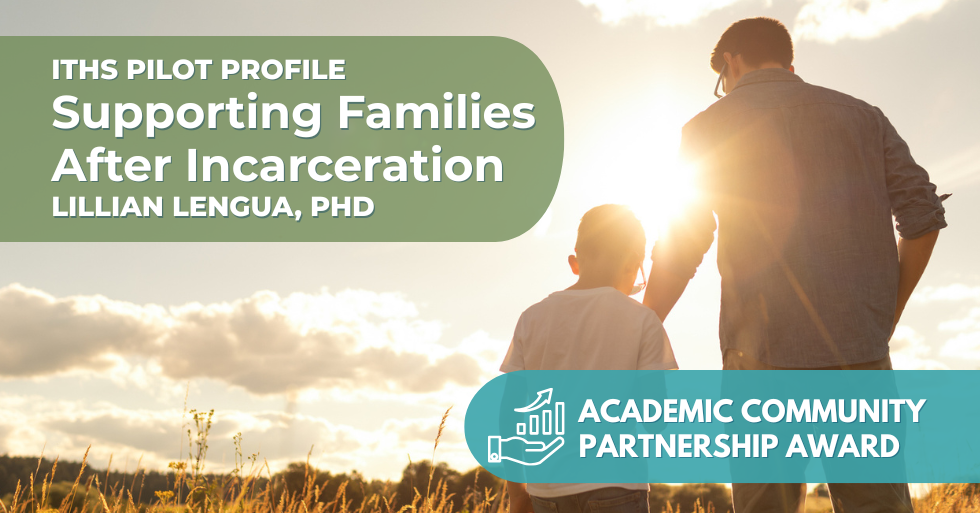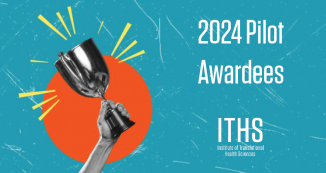
25 Sep ITHS Pilot Profile: Supporting Families After Incarceration
The ITHS-funded Academic Community Partnerships award provides an opportunity for researchers to build relationships in the community, strengthening the translational impact of their project. We sat down for a conversation with Dr. Liliana Lengua, a UW Professor of Psychology and director of the Center for Child and Family Well-Being. She is also the principal investigator of an Academic Community Partnership project titled “A Task-sharing Approach to Supporting Parents Re-entering the Community after Incarceration,” focused on the development and implementation of a parenting intervention for people reconnecting with children following incarceration. In this interview she discusses her experience working with King County Community Partnership for Transition Solutions (KCCPTS) to facilitate this intervention and, more broadly, how the emotional and mental wellbeing of parents is reflected in their children.
This profile interview was conducted on behalf of ITHS Communications by Mar Borrego, an ITHS TL1 Trainee.
Borrego: Hi Dr. Lengua. It is great to finally meet you. Thank you for taking the time to speak with me about your project. Could you tell me how you became involved with ITHS and about your Academic Community Partnership Project?

Dr. Lillian Lengua
Dr. Lengua: Sure! Thanks for having me. It really started with community partnership. I spoke with Joseph Garcia, the executive director at KCCPTS, about potential collaborations a year before we submitted the grant. Mr. Garcia was excited by the idea that people with lived experience of being incarcerated and navigating the transition back to the community would be the best people to deliver a program to other parents with that same experience.
My team really wanted to find a way to support parents who are returning to the community after incarceration, and had already developed a couple of parenting programs that we had been evaluating in the community. When I saw that ITHS had the Community Partnership Grant, we both agreed that that was a great fit for what we had been thinking about and decided to apply.
Borrego: That does sound like a perfect fit. Could you tell me about the content of the program?
Dr. Lengua: The program is based on a previously-developed program called Social and Emotional Competence for Children and Parents, or SEACAP for short. It combines what we know from psychology, cognitive, and behavioral tools, with mindfulness and self compassion practices. We knew we would have to adapt it for our target audience.
But we soon learned that there is a different requirement in this area of work called CCAP, so we chose to change the name based on that feedback. For our program, we decided to focus on parents of early childhood and early grade-school age children, and we called it “Parents Connect.”
This is just one aspect of how we adapted the program in response to the dialogues that we had with formerly-incarcerated individuals when developing the project. We went through a process of thinking about what aspects of Parents Connect would be most applicable and which ones would need to be revised. There was actually very little revision, but the conversations we had were around using more sensitive wording and being more aware of the relationships these families might be coming back to. They might be a parent who is having to rebuild relationships after a long time of incarceration, or maybe feeling guilty for their time away from their child.
Borrego: Can you speak about what obstacles formerly incarcerated parents face when reentering communities and relationships with their children?
Dr. Lengua: We were lucky to have a team of researchers from the University of Wisconsin and Miami University who are experts in the area. We also recruited 2 focus groups: one with moms who had lived experience with incarceration and one with dads.
So across those sources, we collected information about some of those challenges. We found that the biggest challenges are meeting basic needs: housing stability, food security, access to medical care. Additionally, some were working towards regaining custody of their children. These challenges were not something our program was ever going to be able to resolve. The best we can do is be aware of them and advocate for meeting those needs in as many ways that we can. One thing parents said right off the top that we were able to address was that they wanted individuals who could relate to their experiences to deliver the program.
Our model all along has been to train people in the community, people who are in organizations already working with families, to deliver our programs as a supportive mechanism post-incarceration. It’s our belief that these folks are in the best position to deliver a program like ours.
The other concerns they had were logistical. Was this gonna be online or in person? How flexible would our scheduling be? So, really just meeting parents’ scheduling and transportation challenges. Ultimately, what we decided on was a program that lasted six weeks and met 2 hours a week on Saturdays. It was delivered online by two women with lived experience of incarceration who we trained to deliver the program.
Borrego: Were there any other feasibility questions that you had to address ahead of starting the program?
Dr. Lengua: When we met with parents in the focus groups we wanted to know if they thought this content would be meaningful to them and if anything needed to be revised. One aspect of that was asking if this program was meeting them where they’re at. What we found was for the most part, yes. The moms really felt that this is what they were looking for. The dads felt like they might need a little bit more Parenting 101 before diving into this, but we thought this would be a great fit for them despite their concerns.
The next step was to meet with people who would potentially be delivering the program as well as folks who work with KCCPTS staff and others from the Department of Corrections who work in the reentry arena. They also thought that this was going to be a good fit for the parents they work with.
The other piece of feasibility was finding out if parents would even want to sign up for the class and if they would also sign up for the study. When we first tried to recruit a group of parents for the class in the fall, we actually got very little interest at all. But this was also at a time when our KCCPTS partner was dealing with some health issues. They didn’t really have the time and attention to add recruiting participants on our behalf. When we started again in January, we recruited a class of 13 parents. This was a great sign that when there was energy from our community partnership, parents signed up. One barrier we initially didn’t fully consider is how to support the organizations we work with, especially when we are asking them to go above and beyond their duties.
Borrego: What are the outcomes you’d like to see as a result of this project in the short term and what direction do you hope to see in the long term?
Dr. Lengua: The first goal was answering the feasibility question, which we have successfully accomplished. At this point in the project, we have collected data from the 13 participants and are working on analyzing this information. We ultimately would hope to see some improvement in parent mental health, like indicators of depression or anxiety or sense of resilience. Additionally, we would hope that parents would feel confident in being a more effective parent. We would also like to see children having fewer adjustment problems or behavior problems and better social emotional competency. We understand that these improvements may not happen immediately. Often our programs involve a three month follow up which we plan on doing in this study as well.
The long term goal would be to do a much more rigorous evaluation with comparison groups. Maybe a control group of parents who did not participate in the program. That way we can test if any impact we are having is actually a result of the intervention. We would also like to have a better sense of what psychological and biological mechanisms influence these benefits. I’d also like to expand our indicators of emotion regulation in the children by asking teachers about how the kids are doing. It gives us another perspective of how the children are doing socially and emotionally, as well as academically in school.
Borrego: What is one key take-away that you would like people to have regarding incarceration and parent/child relationships? That’s a big question.
Dr. Lengua: One thing that is really clear from the research is that when parents are incarcerated, it has really detrimental effects on children’s developmental outcomes. What is probably the worst part is that there are intergenerational effects. That is, kids who have had a parent who was incarcerated have a higher likelihood of experiencing incarceration themselves. So the system is perpetuating the damage across multiple generations.
My takeaway is that we should be thinking carefully about the reasons people are being incarcerated and whether there are alternatives when a parent has committed a crime.
Borrego: Are there any alternatives that currently exist in the state of Washington?
Dr. Lengua: Washington State actually has a program called the Parenting Sentencing Alternative Program. It’s a pretty innovative program when you look across the country. There are two formats of it. One is for parents at the point of sentencing after a conviction. The court can decide to assign parents to serve their term in their home with their kids. The other format is for parents who are already incarcerated. They can apply to serve the last year of their terms at home with their kids.
We’re currently working with the Department of Corrections to help them evaluate this program and give recommendations for ways that they can help support parents in those contexts. That’s a long answer, but to summarize, I would like people to take into consideration the effects on families when we approach discussions around incarceration.
Borrego: I think that’s a really important point.
Thank you so much for taking the time to talk to me about your project. I’m glad I had the opportunity to interview you and learn more about your work with ITHS.
The Academic Community Partnership award is just one of the funding mechanisms offered through the ITHS Pilots Program. Learn more here about how this program helps investigators explore new ideas, establish proof of concept, and generate preliminary data for larger, future grant applications.







